Lanitovskie environment. Why LANIT believed in blockchain
In this article, we will talk about an internal project for employees of the LANIT group - traditional meetings with experts on current technological topics that take place in our central office on Wednesdays and are called “Own Wednesday”, respectively. At one of these evenings, the head of the DTG startup startup Denis Reimer explained why the LANIT group sees the future in blockchain technologies. Details - in our post under the cut.
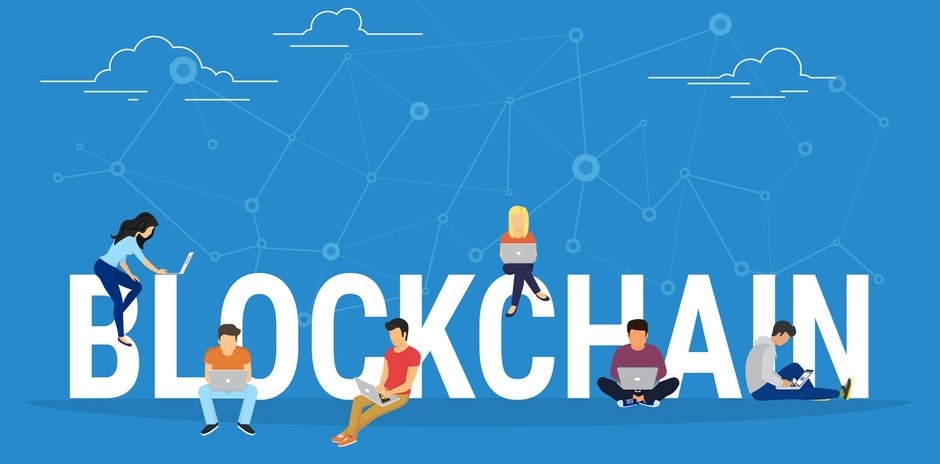
As you know, LANIT is a multidisciplinary group, within which many areas develop and dozens of teams of various specializations work. In order to tell thousands of employees about the work of the divisions, the launch of initiatives and the start-up of start-ups, as well as current IT trends, LANIT holds seminars for employees called “Own Wednesday”. Such meetings help to avoid “going into a vacuum” and have already become for the Lanitians a part of the internal culture, a tradition - “They are waiting for their environment”, discuss, prepare questions and topics for discussion in advance. As a rule, about a hundred employees come to the meeting in the conference hall of the head office of LANIT on Murmansk Proezd, others watch the performance online or look in the recording. The speakers at the seminars are experts from LANIT divisions, as well as invited experts.
Almost always there are two hours of meetings, but there are exceptions - when our guest was the founder of UsabilityLab Dmitry Satin, the conversation was so relevant and fascinating that the audience stayed in the hall for about five hours, did not want to disperse, and we agreed with the speaker about the second meeting in a month.
')
Usually about 10 such meetings take place in a year, in 2017 about 500 people attended them.

Recently, the LANIT startup group DTG (Digital Transformation Group) has become the theme of the next “His own environment”. Vice-President for Digital Transformation of LANIT, head of DTG Denis Reimer told why LANIT believed in the blockchain . LANIT does not plan to issue its own cryptocurrency and ICO. The team of the new direction will focus on the use of blockchain technology for the corporate sector, more precisely to build the interaction of companies within digital ecosystems.
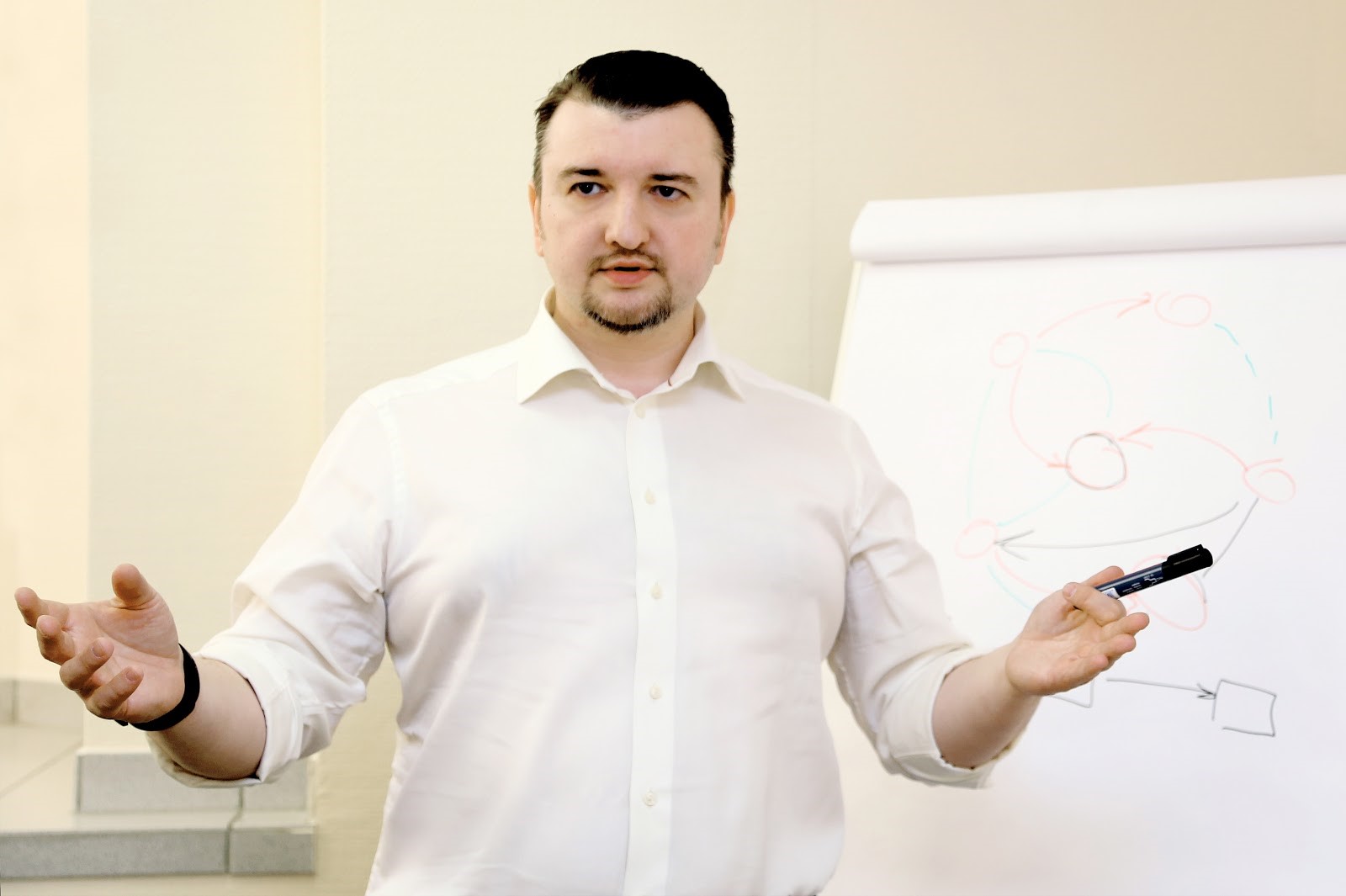
Interest in the use of the blockchain technology is increasing all the time - the costs of research and testing of blockchain solutions are growing every year. Within three years, investments in technology can reach $ 9.2 billion , according to IDC analysts. Gartner is looking even further: by 2030, the effect of technology in business will be $ 3.1 trillion .

The reason for the attention of the business to the blockchain technology is simple: today, participants in digital ecosystems in various industries, whether finance or transportation, spend a lot of time and effort on reconciling and verifying facts and events. The lack of a so-called trusting environment forces them to check each other, or involve a third party to confirm. Blockchain helps to create an atmosphere of trust due to a fundamentally different foundation. Today, any transaction is actually a “trust transaction” - we trust the bank to carry out the operation, we trust the pension fund, which pays out a pension, etc. The trust in the existing system is centralized. Transferring the fixation of states to the blockchain and demonstrating how the mechanisms for confirming states are arranged, we get a fundamentally new level of confidence in what is happening. Technologically, the blockchain is designed in such a way that falsifying or changing data is meaningless - the system guarantees the immutability of data. A peculiar layer appears that provides each of the participants in the process with a guarantee of the reliability of facts and events, and also significantly speeds up the interaction.
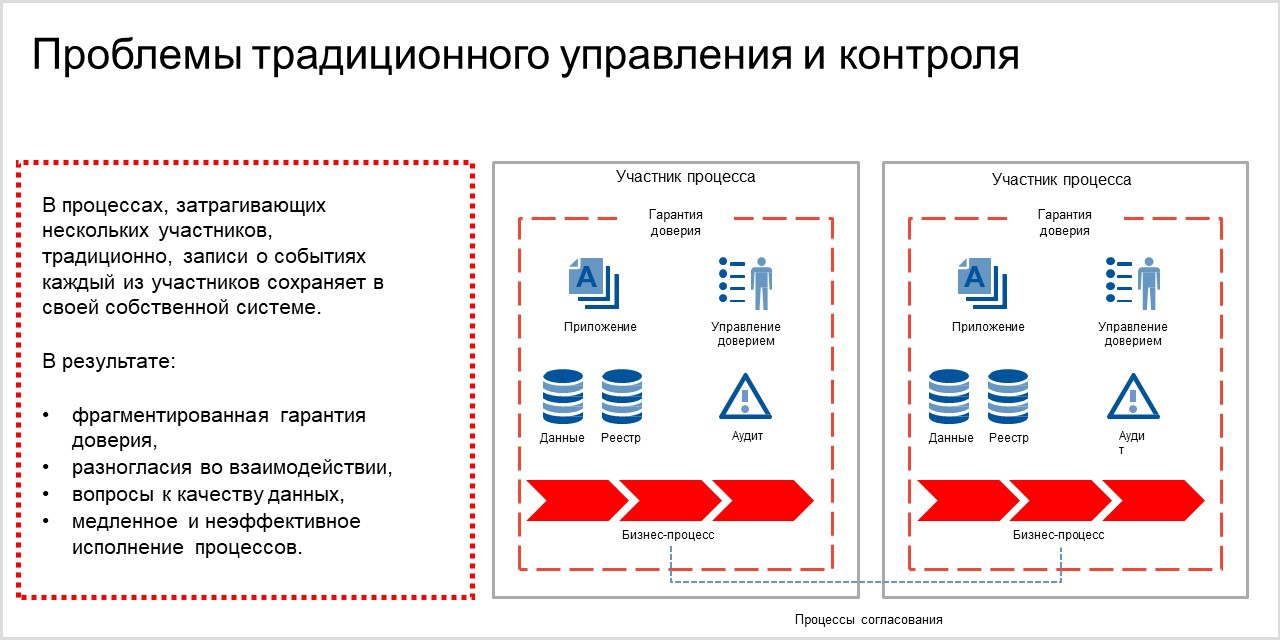

The simplest scenario of using the blockchain technology for business is a distributed registry, a certain system of facts that everyone believes. For example, a land registry is entered into the blockchain. This makes transparent and unchanging information about property rights. In the same way it is possible to publish notarial notes in the blockchain.
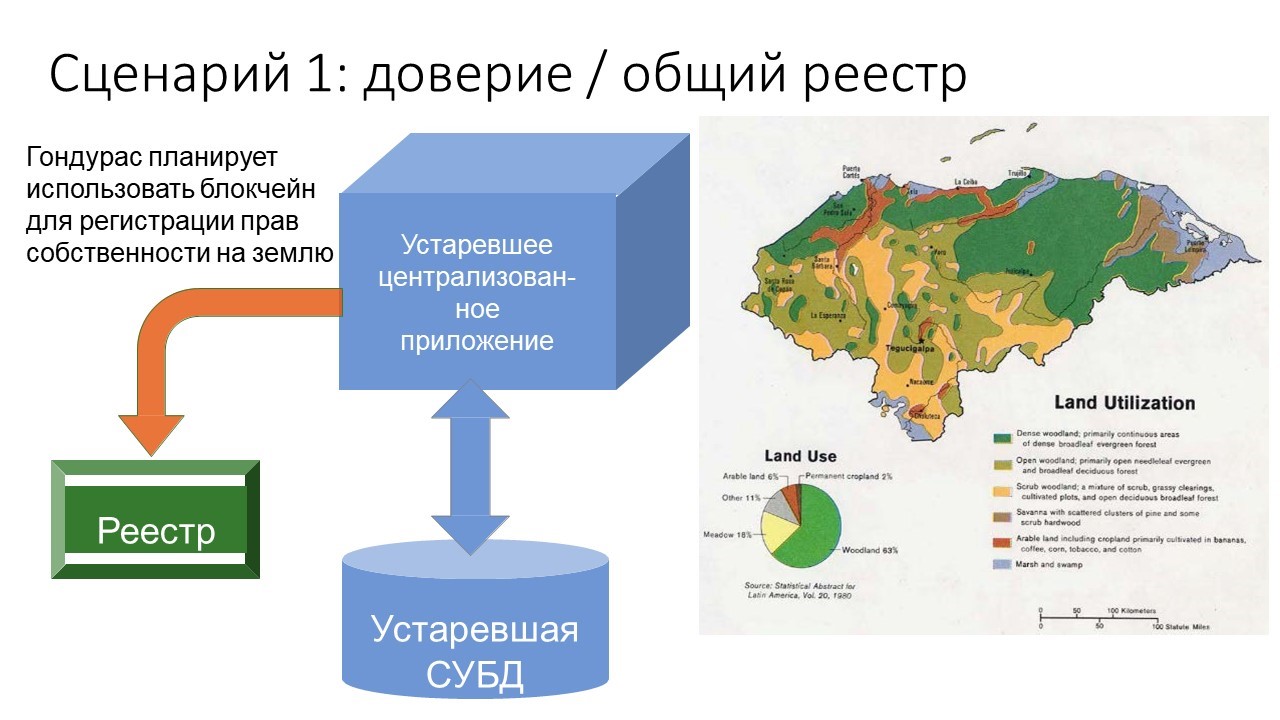
Blockchain solutions can significantly save time and money for companies involved in the supply chain. This is due to the acceleration of workflow within the framework of the established ecosystem: the supplier - the store-retailer - the factoring company (respectively, “P”, “M” and “F” in the diagrams below). The reconciliation process, which used to take weeks, is completed in seconds in the blockchain. This acceleration is due to the creation of a smart contract that takes into account the interests of all parties and helps to avoid misunderstanding. It significantly saves time when working together in supply chain processes, known to the parties to make contracts independently of each other. The transition to the blockchain, of course, may entail new costs, but if in the end the process becomes simpler and less expensive for the participants, then the case can be considered successful.
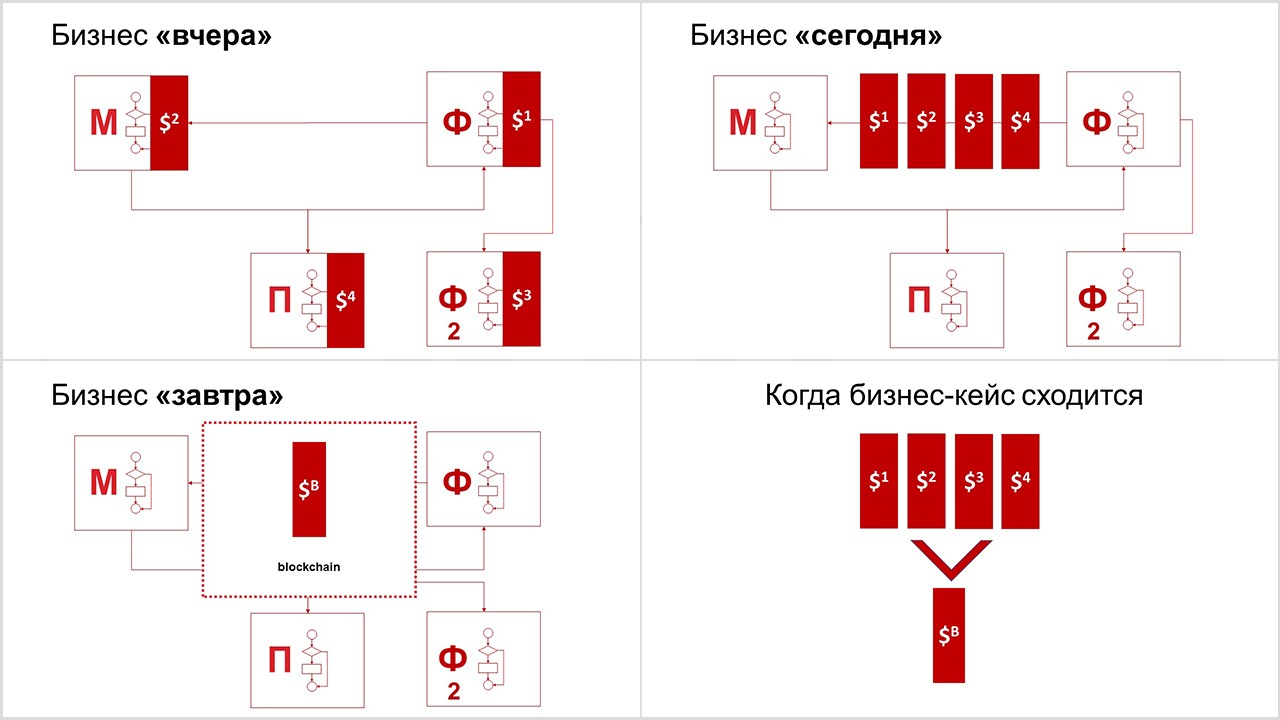 P - supplier. M - store retailer. F - factoring company.
P - supplier. M - store retailer. F - factoring company.
There are other examples. There is a growing interest in using blockchain technology to combat counterfeit. Products are equipped with RFID tags , which allows them to track their path in stages. The point is not so much in the choice of the technology of identification of the original product (RFID tag, barcode or mark), but in the fact that the information from the goods is entered into a general system implemented using a decentralized registry. So the consumer can be sure that the product being purchased is not a fake. For the manufacturer, the whole chain of promotion of its product from the moment of its creation to its sale to the final consumer becomes transparent.
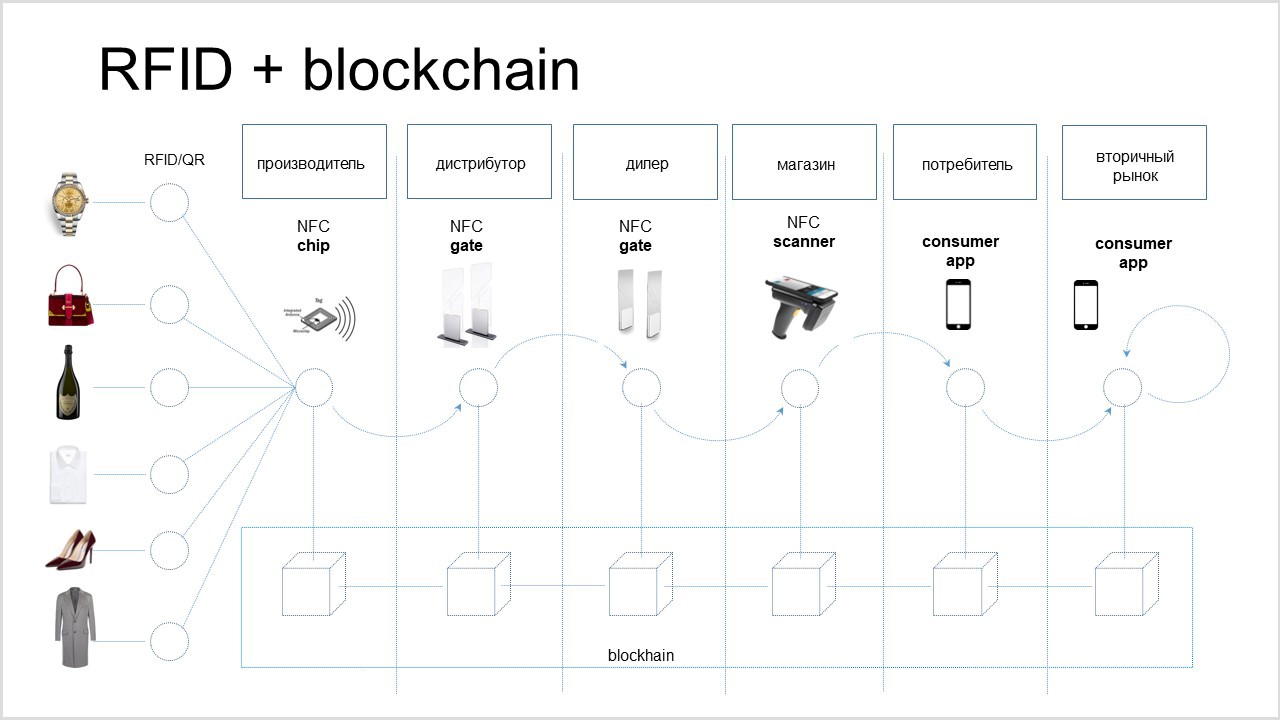
At the beginning of this year, a large-scale project was launched, indicating the blockchain transition for business to a new level. The giant shipping carrier Maersk decided to transfer the process of processing shipping documents to the blockchain platform. To do this, Maersk and IBM have created a joint venture. Thus, in fact, a new maritime logistics operator has emerged, working on a completely new technology. The unnamed company is waiting for the approval of regulators, after which it plans to provide access to its development to other players in the transportation market.
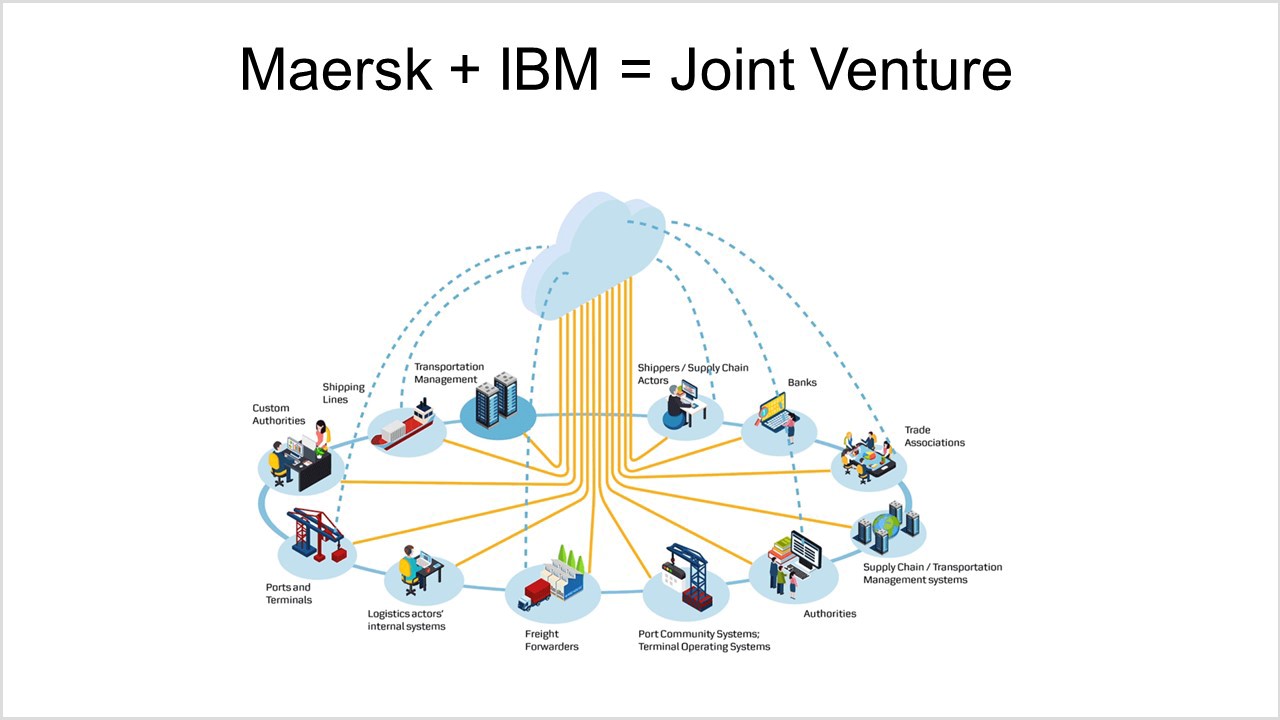
Interesting cases related to the use of blockchain to control supply chains. An example of this is the joint project of IBM, Walmart, Chinese retailer giant Jingdong Mall and Beijing Tsinghua University called Food Safety. The prerequisite for the project was the desire of the Chinese authorities to protect consumers from poor quality, possibly contaminated products in stores. It is assumed that upon completion of the project, the entire supply chain of goods, from production to the supermarket shelf, will be fixed in the blockchain system. Unilever and Nestle have already joined the project.
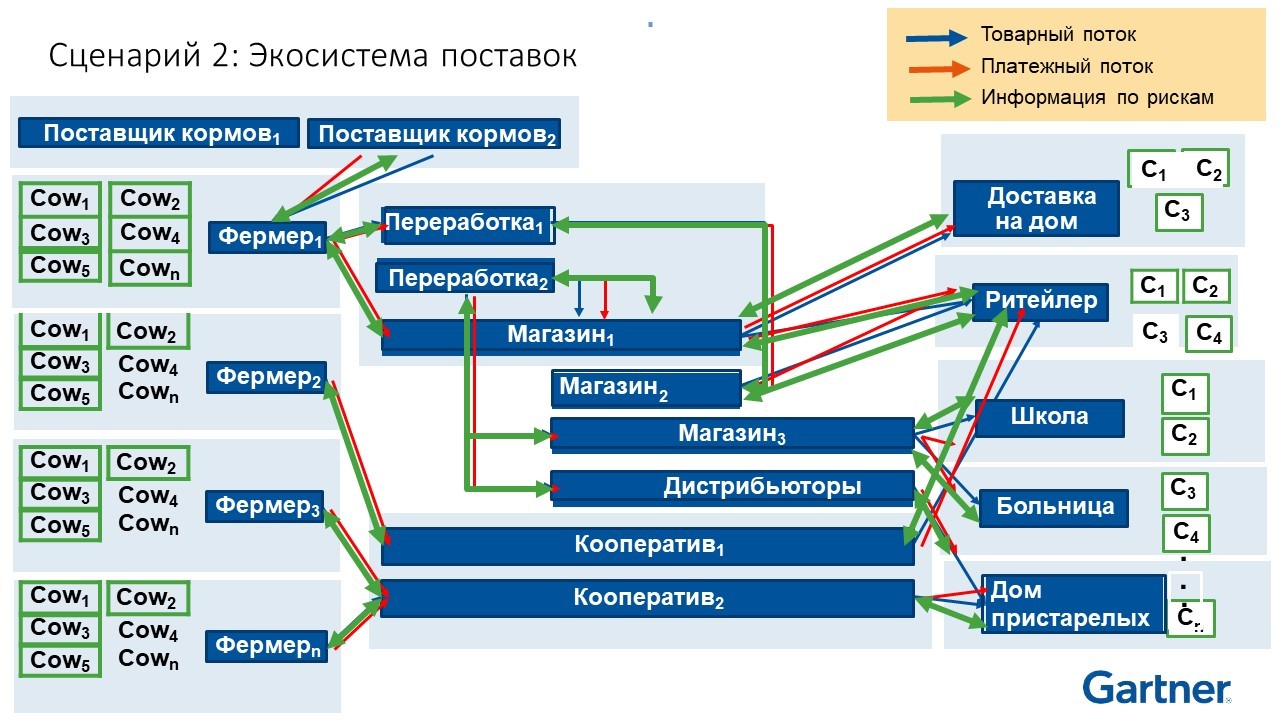
Firstly, the existing generation of blockchain platforms shows that the technology is not yet so efficient and mature enough to solve large-scale tasks. Secondly, the business should be ready to work more closely with other market participants, adapting the win-win philosophy. Case studies are needed where one hundred percent result from joint actions will be viewed. The third is the data. What will be the way of their receipt and format - all this needs to be negotiated.
That is why the construction, testing and implementation of a large and complex distributed system does not seem to be a primary and simple task. It is necessary in parts to collect small cases that will allow you to work out and test the technology.
In the meantime, there are many pilots on the market who use blockchain technology only for the sake of HYIP and do not give results. Similar things happened a few years ago with Big Data. This is a normal situation, because the corporate blockchain is in the development stage. DTG will actively participate in the creation of a bank of viable cases using blockchain technology, as well as related API, IoT technologies for digital ecosystems of various types.
PS By the way, the next “Own Wednesday” has just been held on the subject of “Mining tools forcryptocurrency of business processes: how to get an AS IS business process diagram in 3 minutes and find out where it is inefficient”. And we plan to talk about the smart city in the near future, about the organization of development and testing on federal-scale projects and other interesting topics.

Wednesday meetings
As you know, LANIT is a multidisciplinary group, within which many areas develop and dozens of teams of various specializations work. In order to tell thousands of employees about the work of the divisions, the launch of initiatives and the start-up of start-ups, as well as current IT trends, LANIT holds seminars for employees called “Own Wednesday”. Such meetings help to avoid “going into a vacuum” and have already become for the Lanitians a part of the internal culture, a tradition - “They are waiting for their environment”, discuss, prepare questions and topics for discussion in advance. As a rule, about a hundred employees come to the meeting in the conference hall of the head office of LANIT on Murmansk Proezd, others watch the performance online or look in the recording. The speakers at the seminars are experts from LANIT divisions, as well as invited experts.
Almost always there are two hours of meetings, but there are exceptions - when our guest was the founder of UsabilityLab Dmitry Satin, the conversation was so relevant and fascinating that the audience stayed in the hall for about five hours, did not want to disperse, and we agreed with the speaker about the second meeting in a month.
')
Usually about 10 such meetings take place in a year, in 2017 about 500 people attended them.

LANIT believe in blockchain
Recently, the LANIT startup group DTG (Digital Transformation Group) has become the theme of the next “His own environment”. Vice-President for Digital Transformation of LANIT, head of DTG Denis Reimer told why LANIT believed in the blockchain . LANIT does not plan to issue its own cryptocurrency and ICO. The team of the new direction will focus on the use of blockchain technology for the corporate sector, more precisely to build the interaction of companies within digital ecosystems.

Interest in the use of the blockchain technology is increasing all the time - the costs of research and testing of blockchain solutions are growing every year. Within three years, investments in technology can reach $ 9.2 billion , according to IDC analysts. Gartner is looking even further: by 2030, the effect of technology in business will be $ 3.1 trillion .

The reason for the attention of the business to the blockchain technology is simple: today, participants in digital ecosystems in various industries, whether finance or transportation, spend a lot of time and effort on reconciling and verifying facts and events. The lack of a so-called trusting environment forces them to check each other, or involve a third party to confirm. Blockchain helps to create an atmosphere of trust due to a fundamentally different foundation. Today, any transaction is actually a “trust transaction” - we trust the bank to carry out the operation, we trust the pension fund, which pays out a pension, etc. The trust in the existing system is centralized. Transferring the fixation of states to the blockchain and demonstrating how the mechanisms for confirming states are arranged, we get a fundamentally new level of confidence in what is happening. Technologically, the blockchain is designed in such a way that falsifying or changing data is meaningless - the system guarantees the immutability of data. A peculiar layer appears that provides each of the participants in the process with a guarantee of the reliability of facts and events, and also significantly speeds up the interaction.


How can I use the blockchain for b2b?
The simplest scenario of using the blockchain technology for business is a distributed registry, a certain system of facts that everyone believes. For example, a land registry is entered into the blockchain. This makes transparent and unchanging information about property rights. In the same way it is possible to publish notarial notes in the blockchain.

Blockchain solutions can significantly save time and money for companies involved in the supply chain. This is due to the acceleration of workflow within the framework of the established ecosystem: the supplier - the store-retailer - the factoring company (respectively, “P”, “M” and “F” in the diagrams below). The reconciliation process, which used to take weeks, is completed in seconds in the blockchain. This acceleration is due to the creation of a smart contract that takes into account the interests of all parties and helps to avoid misunderstanding. It significantly saves time when working together in supply chain processes, known to the parties to make contracts independently of each other. The transition to the blockchain, of course, may entail new costs, but if in the end the process becomes simpler and less expensive for the participants, then the case can be considered successful.

There are other examples. There is a growing interest in using blockchain technology to combat counterfeit. Products are equipped with RFID tags , which allows them to track their path in stages. The point is not so much in the choice of the technology of identification of the original product (RFID tag, barcode or mark), but in the fact that the information from the goods is entered into a general system implemented using a decentralized registry. So the consumer can be sure that the product being purchased is not a fake. For the manufacturer, the whole chain of promotion of its product from the moment of its creation to its sale to the final consumer becomes transparent.

At the beginning of this year, a large-scale project was launched, indicating the blockchain transition for business to a new level. The giant shipping carrier Maersk decided to transfer the process of processing shipping documents to the blockchain platform. To do this, Maersk and IBM have created a joint venture. Thus, in fact, a new maritime logistics operator has emerged, working on a completely new technology. The unnamed company is waiting for the approval of regulators, after which it plans to provide access to its development to other players in the transportation market.

Interesting cases related to the use of blockchain to control supply chains. An example of this is the joint project of IBM, Walmart, Chinese retailer giant Jingdong Mall and Beijing Tsinghua University called Food Safety. The prerequisite for the project was the desire of the Chinese authorities to protect consumers from poor quality, possibly contaminated products in stores. It is assumed that upon completion of the project, the entire supply chain of goods, from production to the supermarket shelf, will be fixed in the blockchain system. Unilever and Nestle have already joined the project.

What is the difficulty of implementing blockchain in business processes?
Firstly, the existing generation of blockchain platforms shows that the technology is not yet so efficient and mature enough to solve large-scale tasks. Secondly, the business should be ready to work more closely with other market participants, adapting the win-win philosophy. Case studies are needed where one hundred percent result from joint actions will be viewed. The third is the data. What will be the way of their receipt and format - all this needs to be negotiated.
That is why the construction, testing and implementation of a large and complex distributed system does not seem to be a primary and simple task. It is necessary in parts to collect small cases that will allow you to work out and test the technology.
In the meantime, there are many pilots on the market who use blockchain technology only for the sake of HYIP and do not give results. Similar things happened a few years ago with Big Data. This is a normal situation, because the corporate blockchain is in the development stage. DTG will actively participate in the creation of a bank of viable cases using blockchain technology, as well as related API, IoT technologies for digital ecosystems of various types.
We are ready to invite in our team of strong developers and architects.
PS By the way, the next “Own Wednesday” has just been held on the subject of “Mining tools for
Source: https://habr.com/ru/post/360529/
All Articles